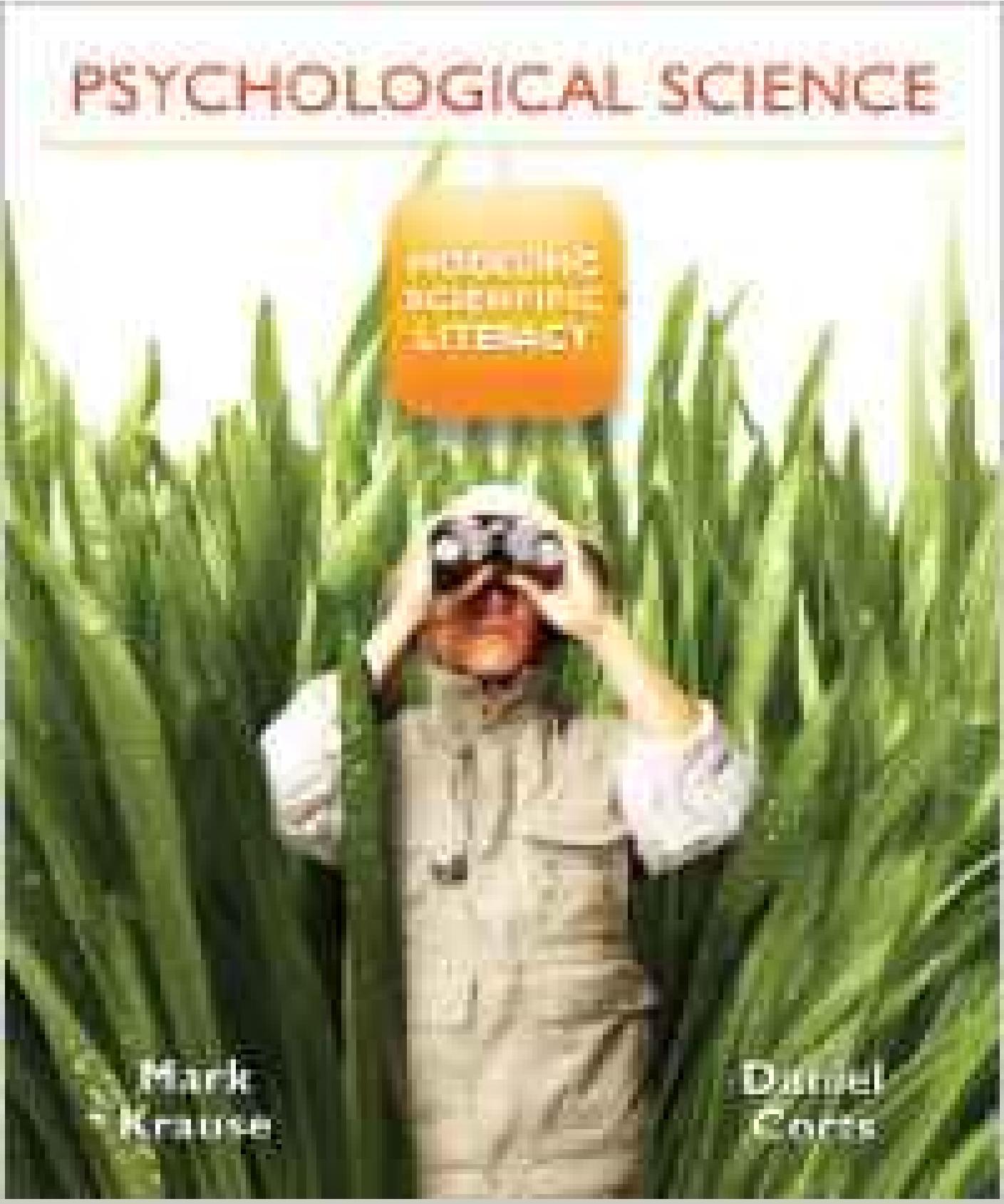Psychological Science Modeling Scientific Literacy 1st Edition by Mark Krause,Daniel Corts ISBN 0131739859 978-0131739895
$70.00 Original price was: $70.00.$35.00Current price is: $35.00.
Instant download Psychological Science Modeling Scientific Literacy after payment
Psychological Science Modeling Scientific Literacy 1st Edition by Mark Krause,Daniel Corts PDF Instant Download/Delivery: 0131739859 978-0131739895
Full download Psychological Science Modeling Scientific Literacy 1st Edition after payment

Product details:
ISBN 10: 0131739859
ISBN 13: 978-0131739895
Author: Mark Krause,Daniel Corts
Helping students become scientifically literate.
Psychological Science: Modeling Scientific Literacy helps students view psychology as a practical, modern science–and gives them the tools to better understand their world.
Organized around a scientific literacy model, the text’s content and features encourage scientific inquiry, prompting students to ask a series of scientific-minded questions about each topic. All aspects of the book–the topics covered, learning objectives, quizzes, even the modular format–have been developed to enable students to categorize the overwhelming amount of information they encounter, and to ignite their interest in psychological science.
To ensure that scientific literacy is at the core, content and features are organized around a scientific literacy model asking students:
o What do we know about this?
o How can science help to explain this?
o Can we critically evaluate the evidence?
o Why is this relevant?
Teaching & Learning Experience
- Personalize Learning — The new MyPsychLab delivers proven results in helping students succeed, provides engaging experiences that personalize learning, and comes from a trusted partner with educational expertise and a deep commitment to helping students and instructors achieve their goals.
- Improve Critical Thinking — Features have been carefully chosen to reinforce the development of complex thinking skills.
- Engage Students — Substantial end-of-chapter materials and the new MyPsychLab Video Series provide an interactive educational experience for students. YouTube links direct students to highly relevant and engaging video content.
- Explore Research — Research methodology is included and explored throughout the text to improve students’ scientific literacy skills.
- Understand Culture and Diversity – A Biopsychosocial Perspectives feature reminds students that behavior is affected by biology, individual thoughts and experiences, and social and cultural factors.
Table of contents:
IN THIS SECTION:
1.) BRIEF
2.) COMPREHENSIVE
BRIEF TABLE OF CONTENTS:
Chapter 1: Introducing Psychological Science
Module 1.1: The Science of Psychology Module 1.2: How Psychology Became a Science Module 1.3: Putting Psychology to Work: Careers in Psychology and Related Fields
Chapter 2: Reading and Evaluating Scientific Research
Module 2.1: Principles of Scientific Research Module 2.2: Scientific Research Designs Module 2.3: Ethics in Psychological Research Module 2.4: A Statistical Primer
Chapter 3: Biological Psychology
Module 3.1: Genetic and Evolutionary Perspectives on Behavior Module 3.2: How the Nervous System Works: Cells and Neurotransmitters Module 3.3: Structure and Organization of the Nervous System
Chapter 4: Sensation and Perception
Module 4.1: Sensation and Perception at a Glance Module 4.2: The Visual System Module 4.3: The Auditory System Module 4.4: Touch and the Chemical Senses
Chapter 5: Consciousness
Module 5.1: Biological Rhythms of Consciousness: Wakefulness and Sleep Module 5.2: Altered States of Consciousness: Hypnosis, Meditation, and Disorders Module 5.3: Drugs and Consciousness Experience
Chapter 6: Learning
Module 6.1: Classical Conditioning: Learning by Association Module 6.2: Operant Conditioning: Learning through Consequences Module 6.3: Cognitive and Observational Learning
Chapter 7: Memory
Module 7.1: Memory Systems Module 7.2: Encoding and Retrieving Memories Module 7.3 Constructing and Reconstructing Memories
Chapter 8: Thought and Language
Module 8.1: The Organization of Knowledge Module 8.2: Problem Solving, Judgment, and Decision Making Module 8.3: Language
Chapter 9: Intelligence, Aptitude, and Cognitive Abilities
Module 9.1: Measuring Aptitude and Intelligence Module 9.2: Understanding Intelligence Module 9.3: Heredity, Environment and Intelligence
Chapter 10: Lifespan Development
Module 10.1: Methods, Concepts and Prenatal Development Module 10.2: Infancy and Childhood Module 10.3: Adolescence Module 10.4: Adulthood and Aging
Chapter 11: Motivation and Emotion
Module 11.1: Hunger & Eating Module 11.2: Sexual Motivation Module 11.3: Social and Achievement Motivation Module 11.4: Emotion
Chapter 12: Personality
Module 12.1: Contemporary Approaches to Personality Module 12.2: Cultural and Biological Approaches to Personality Module 12.3: Psychodynamic and Humanistic Approaches to Personality
Chapter 13: Psychological Disorders
Module 13.1: Defining and Classifying Psychological Disorders Module 13.2: Personality and Dissociative Disorders Module 13.3: Anxiety and Mood Disorders Module 13.4: Schizophrenia
Chapter 14: Therapies
Module 14.1: Treating Psychological Disorders Module 14.2: Psychological Therapies Module 14.3: Biomedical Therapies
Chapter 15: Social Psychology
Module 15.1: Social Cognition Module 15.2: Social Influences Module 15.3: Helping and Harming Others
Chapter 16: Health, Stress and Coping
Module 16.1: Behavior and Health Module 16.2: Stress and Illness Module 16.3: Coping and Well-Being
Chapter 17: Industrial/Organizational Psychology
Module 17.1: Personnel Psychology: Hiring and Maintaining an Effective Workforce Module 17.2: Attitudes and Affect at Work Module 17.3: Leadership, Teamwork, and the Organization
COMPREHENSIVE TABLE OF CONTENTS:
Chapter 1: Introducing Psychological Science
Module 1.1: The Science of Psychology
The Scientific Method Building Scientific Literacy Module Summary
Module 1.2: How Psychology Became a Science
Psychology’s Philosophical and Scientific Origins The Beginnings of Contemporary Psychology Module Summary
Module 1.3: Putting Psychology to Work: Careers in Psychology and Related Fields
Professions in Psychology Module Summary Chapter In Focus
Chapter 2: Reading and Evaluating Scientific Research
Module 2.1: Principles of Scientific Research
The Five Characteristics of Quality Scientific Research Risky Paths to Truth: Anecdotes, Authority and Common Sense Module Summary
Module 2.2: Scientific Research Designs
Descriptive Research Correlational Research Experimental Research Module Summary
Module 2.3: Ethics in Psychological Research
Promoting Welfare of Research Participants Ethical Collection, Storage, and Reporting of Data Module Summary
Module 2.4: A Statistical Primer
Descriptive Statistics Hypothesis Testing: Evaluating the Outcome of the Study Module Summary Chapter In Focus
Chapter 3: Biological Psychology
Module 3.1: Genetic and Evolutionary Perspectives on Behavior
Heredity and Behavior Evolutionary Insights into Human Behavior Module Summary
Module 3.2: How the Nervous System Works: Cells and Neurotransmitters
Neural Communication The Chemical Messengers: Neurotransmitters and Hormones Module Summary
Module 3.3: Structure and Organization of the Nervous System
Divisions of the Nervous System The Brain and Its Structures Windows to the Brain: Measuring and Observing Brain Activity Module Summary Chapter In Focus
Chapter 4: Sensation and Perception
Module 4.1: Sensation and Perception at a Glance
Sensing the World around Us Perceiving the World around Us Module Summary
Module 4.2: The Visual System
The Human Eye The Visual Experience Module Summary
Module 4.3: The Auditory System
Sound and the Structures of the Ear The Perception of Sound Module Summary
Module 4.4: Touch and the Chemical Senses
The Sense of Touch The Chemical Senses: Taste and Smell Module Summary Chapter In Focus
Chapter 5: Consciousness
Module 5.1: Biological Rhythms of Consciousness: Wakefulness and Sleep
What Is Sleep?
Why We Need Sleep Theories of Dreaming Disorders and Problems with Sleep Module Summary
Module 5.2: Altered States of Consciousness: Hypnosis, Meditation, and Disorders
Hypnosis Meditation and Déjà Vu Disorders of Consciousness Module Summary
Module 5.3: Drugs and Consciousness Experience
Commonly Abused Illegal Drugs Legal Drugs and Their Effects on Consciousness Habitual Drug Use Module Summary Chapter In Focus
Chapter 6: Learning
Module 6.1: Classical Conditioning: Learning by Association
Pavlov’s Dogs: Classical Conditioning of Salivation Processes of Classical Conditioning Applications of Classical Conditioning Learning without Awareness Module Summary
Module 6.2: Operant Conditioning: Learning through Consequences
Processes of Operant Conditioning Applications of Operant Conditioning Module Summary
Module 6.3: Cognitive and Observational Learning
Cognitive Perspectives on Learning Observational Learning Module Summary Chapter In Focus
Chapter 7: Memory
Module 7.1: Memory Systems
The Atkinson-Shiffrin Model The Working Memory Model: An Active STM System Long-Term Memory Systems: Declarative and Procedural Memories The Cognitive Neuroscience of Memory Module Summary
Module 7.2: Encoding and Retrieving Memories
Encoding and Retrieval Emotional Memories Forgetting and Remembering Module Summary
Module 7.3 Constructing and Reconstructing Memories
How Memories Are Organized and Constructed False Memories: Constructing Memories of What Never Happened Module Summary Chapter In Focus
Chapter 8: Thought and Language
Module 8.1: The Organization of Knowledge
Concepts and Categories Culture and Categories Module Summary
Module 8.2: Problem Solving, Judgment, and Decision Making
Defining and Solving Problems Judgment and Decision Making Module Summary
Module 8.3: Language
What Is Language?
Language Development, Evolution, and the Brain Module Summary Chapter In Focus
Chapter 9: Intelligence, Aptitude, and Cognitive Abilities
Module 9.1: Measuring Aptitude and Intelligence
Achievement and Aptitude Approaches to Intelligence Testing Module Summary
Module 9.2: Understanding Intelligence
Intelligence as a Single, General Ability Intelligence as Multiple, Specific Abilities The Flynn Effect: Is Everyone Getting Smarter?
Module Summary
Module 9.3: Heredity, Environment and Intelligence
Intelligence and Heredity Environmental Influences on Intelligence Group Similarities and Differences in Test Scores Beyond the Test: Personal Beliefs Impact IQ Scores Module Summary Chapter In Focus
Chapter 10: Lifespan Development
Module 10.1: Methods, Concepts and Prenatal Development
Measuring Developmental Trends: Methods and Patterns Prenatal to Newborns: From One Cell to Billions Module Summary
Module 10.2: Infancy and Childhood
Physical Changes in Infancy and Childhood Cognitive Changes: Piaget’s Cognitive Development Theory Social Development: Attachment, Personality, and Reading Others Module Summary
Module 10.3: Adolescence
Physical Changes in Adolescence Cognitive Development: Thinking and Moral Reasoning Social Development: Identity and Relationships Module Summary
Module 10.4: Adulthood and Aging
Physical Changes in Adulthood Cognitive Development: Wisdom and Change Social Development: Intimacy and Commitment Module Summary Chapter In Focus
Chapter 11: Motivation and Emotion
Module 11.1: Hunger & Eating
Physiological Aspects of Hunger Psychological Aspects of Hunger Disorders of Eating Module Summary
Module 11.2: Sexual Motivation
Human Sexual Behavior: Psychological and Biological Influences Sexual Orientation: Biology and Environment Module Summary
Module 11.3: Social and Achievement Motivation
The Need to Belong Achievement Motivation Module Summary
Module 11.4: Emotion
Biology of Emotion The Psychological Experience of Emotions: Competing Theories The Role of Culture in Emotions Module Summary Chapter In Focus
Chapter 12: Personality
Module 12.1: Contemporary Approaches to Personality
The Trait Perspective Behaviorist and Social-Cognitive Perspectives Module Summary
Module 12.2: Cultural and Biological Approaches to Personality
Culture and Personality How Genes Affect Personality The Role of Evolution in Personality The Brain and Personality Module Summary
Module 12.3: Psychodynamic and Humanistic Approaches to Personality
The Psychodynamic Perspective Alternatives to the Psychodynamic Approach Humanistic Perspectives Module Summary Chapter In Focus
Chapter 13: Psychological Disorders
Module 13.1: Defining and Classifying Psychological Disorders
Defining Abnormal Behavior Mental Health in the Public Sphere Module Summary
Module 13.2: Personality and Dissociative Disorders
Defining and Classifying Personality Disorders Dissociative Identity Disorder Module Summary
Module 13.3: Anxiety and Mood Disorders
Anxiety Disorders Mood Disorders Module Summary
Module 13.4: Schizophrenia
Symptoms and Types of Schizophrenia Explaining Schizophrenia Module Summary Chapter In Focus
Chapter 14: Therapies
Module 14.1: Treating Psychological Disorders
Barriers to Psychological Treatment Mental Health Providers and Settings Evaluating Treatments Module Summary
Module 14.2: Psychological Therapies
Insight Therapies Cognitive, Behavioral, and Group Therapies Can Therapy Be Harmful?
Module Summary
Module 14.3: Biomedical Therapies
Drug Treatments Technological and Surgical Methods Module Summary Chapter In Focus
Chapter 15: Social Psychology
Module 15.1: Social Cognition
Person Perception Stereotypes Prejudice and Discrimination Module Summary
Module 15.2: Social Influences
Norms, Role, and Conformity Group Influence and Authority Attitudes and Actions Module Summary
Module 15.3: Helping and Harming Others
Empathy, Altruism, and Helping Aggression Module Summary Chapter In Focus
Chapter 16: Health, Stress and Coping
Module 16.1: Behavior and Health
Smoking Obesity Psychosocial Influences on Health Quick Quiz Module Summary
Module 16.2: Stress and Illness
Physiology of Stress Stress, Immunity, and Illness Stress, Personality, and Illness Module Summary
Module 16.3: Coping and Well-Being
Coping Perceived Control Mediation, Relaxation, and Biofeedback Nutrition and Exercise Module Summary Chapter In Focus
Chapter 17: Industrial/Organizational Psychology
Module 17.1: Personnel Psychology: Hiring and Maintaining an Effective Workforce
Job Analysis: Understanding the Requirements for the Job Selection: Hiring the Right People Performance Appraisal Module Summary
Module 17.2: Attitudes and Affect at Work
Employee Affect, Attitudes, and Job Satisfaction Workplace Aggression Module Summary
Module 17.3: Leadership, Teamwork, and the Organization
Finding and Producing Effective Leaders Working in Teams Module Summary Chapter In Focus
People also search for:
Psychological Science Modeling Scientific Literacy
Psychological Science Modeling Scientific Literacy 1st edition
Psychological Science Modeling Scientific Literacy Mark Krause,Daniel Corts
scientific modeling examples
psychological science modeling scientific literacy pdf
Tags:
Mark Krause,Daniel Corts,Psychological,Modeling,Scientific Literacy



